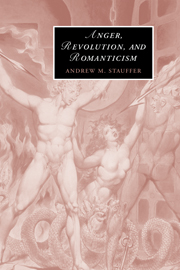Book contents
- Frontmatter
- Contents
- Acknowledgments
- List of abbreviations
- Introduction: fits of rage
- 1 Towards Romantic anger
- 2 Burke, Coleridge, and the rage for indignation
- 3 Inflammatory reactions
- 4 Provocation and the plot of anger
- 5 Shelley and the masks of anger
- 6 Byron's curse
- Epilogue
- Notes
- Bibliography
- Index
- CAMBRIDGE STUDIES IN ROMANTICISM
- References
Bibliography
Published online by Cambridge University Press: 22 September 2009
- Frontmatter
- Contents
- Acknowledgments
- List of abbreviations
- Introduction: fits of rage
- 1 Towards Romantic anger
- 2 Burke, Coleridge, and the rage for indignation
- 3 Inflammatory reactions
- 4 Provocation and the plot of anger
- 5 Shelley and the masks of anger
- 6 Byron's curse
- Epilogue
- Notes
- Bibliography
- Index
- CAMBRIDGE STUDIES IN ROMANTICISM
- References
- Type
- Chapter
- Information
- Anger, Revolution, and Romanticism , pp. 200 - 214Publisher: Cambridge University PressPrint publication year: 2005

